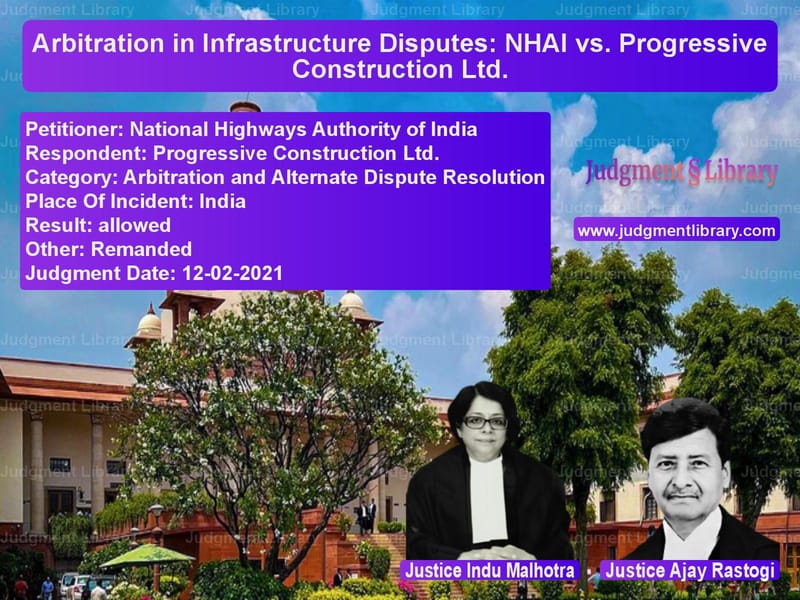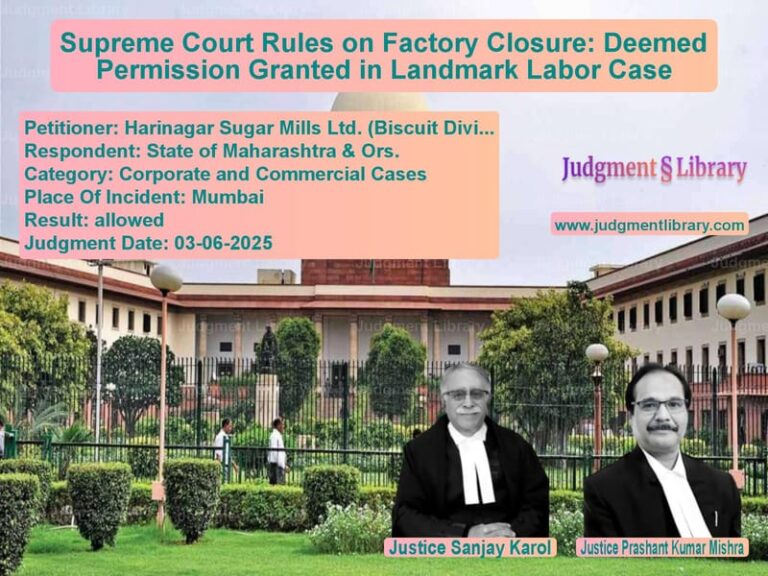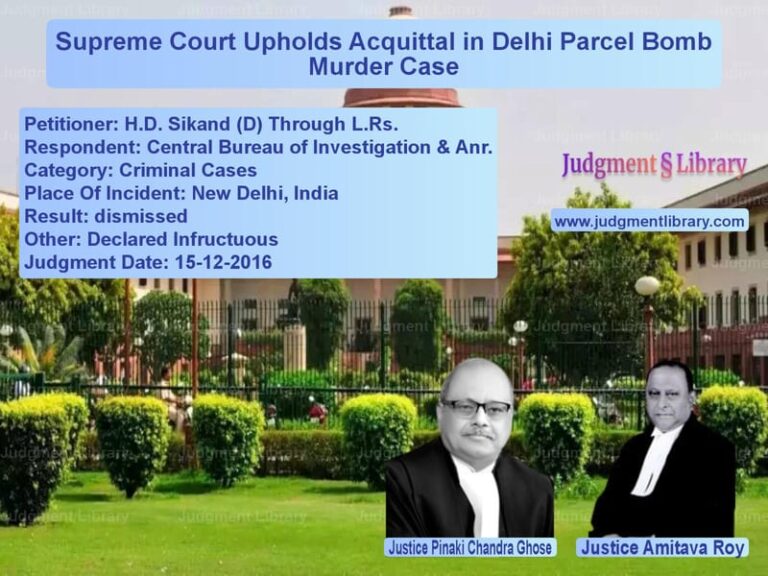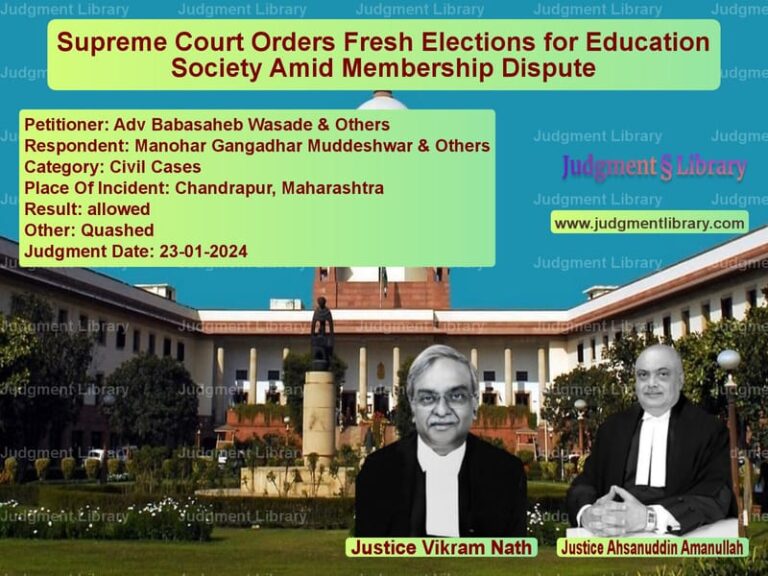Arbitration in Infrastructure Disputes: NHAI vs. Progressive Construction Ltd.
The case of National Highways Authority of India (NHAI) vs. Progressive Construction Ltd. is a critical judgment addressing arbitration disputes arising in large-scale infrastructure projects. The dispute primarily revolved around the validity of an arbitral award and subsequent judicial interventions. The Supreme Court ultimately directed a fresh arbitration to ensure a fair and legally sound resolution.
Background of the Case
The dispute arose between NHAI and Progressive Construction Ltd. over contractual obligations in an infrastructure project. The matter was initially resolved through a three-member arbitral tribunal, which delivered its award on April 27, 2016. However, NHAI challenged the award under Section 34 of the Arbitration and Conciliation Act, 1996, arguing that the tribunal had made incorrect inferences and ignored key evidence.
The Delhi High Court’s Single Judge Bench set aside substantial portions of the arbitral award, stating that the tribunal had failed to properly evaluate the evidence presented. Both parties then filed cross-appeals under Section 37 before the Division Bench, which further limited the scope of the appeals to specific claims.
NHAI then approached the Supreme Court, challenging the Division Bench’s order and seeking a fresh arbitration for all claims and counterclaims.
Key Legal Issues
- Whether the arbitral tribunal’s award was valid under the principles of arbitration law.
- Whether the High Court was justified in setting aside substantial portions of the award under Section 34.
- Whether the Division Bench erred in restricting the scope of the appeals.
- Whether a fresh arbitration was necessary to ensure a fair adjudication of all claims.
Arguments by NHAI
- NHAI argued that the arbitral tribunal had wrongly interpreted contractual documents and failed to consider key financial and technical data.
- It contended that the Single Judge correctly intervened under Section 34 to rectify the errors of the arbitral tribunal.
- NHAI maintained that the Division Bench’s restriction of appeals was unjustified, as all claims required reconsideration.
- The appellant sought a fresh arbitration process, citing procedural lapses in the previous proceedings.
Arguments by Progressive Construction Ltd.
- The respondent contended that the arbitral award was fair and that courts should not interfere with arbitration decisions unless there is a clear violation of law.
- It argued that the Division Bench correctly confined the scope of appeals to certain claims, preventing unnecessary prolongation of litigation.
- Progressive Construction Ltd. agreed to fresh arbitration but preferred a sole arbitrator instead of a new three-member tribunal.
Supreme Court’s Analysis
The Supreme Court examined the procedural and substantive aspects of the arbitration process and observed:
- “The arbitral tribunal has drawn incorrect inferences from the documents on record and has not considered vital and relevant evidence.”
- “A substantial number of claims and counterclaims were rejected due to improper evaluation of evidence, necessitating fresh adjudication.”
- “Arbitration should ensure a fair and conclusive resolution of disputes, and judicial intervention is warranted when procedural fairness is compromised.”
The Court emphasized that arbitration should be conducted in a manner that maintains procedural fairness, particularly in high-value infrastructure disputes.
Final Judgment
The Supreme Court set aside the Delhi High Court’s order dated December 4, 2019, and issued the following directives:
- A fresh arbitration process to be conducted by the Indian Council of Arbitration in accordance with its established rules and procedures.
- The appointment of Justice G. S. Singhvi, a former Supreme Court judge, as the sole arbitrator.
- The arbitrator to have the authority to appoint qualified engineers or experts under Section 26 of the Arbitration and Conciliation Act, 1996, to assist in technical matters.
- Both parties to bear the arbitrator’s fees equally.
- The arbitration process must be completed within the statutory period of 12 months as prescribed under Section 29A of the Arbitration Act.
The Court concluded that this approach would ensure an impartial and efficient resolution of the dispute.
Implications of the Judgment
This judgment has significant implications for arbitration in infrastructure disputes:
- It reinforces the principle that courts can intervene in arbitration proceedings when tribunals fail to evaluate evidence properly.
- It highlights the importance of procedural fairness in arbitration, particularly in high-stakes commercial disputes.
- It clarifies that courts can order fresh arbitration if previous proceedings were tainted by procedural errors.
- It ensures that arbitration remains an effective and reliable dispute resolution mechanism by upholding judicial scrutiny in cases of procedural lapses.
Conclusion
The Supreme Court’s decision in NHAI vs. Progressive Construction Ltd. underscores the role of judicial intervention in arbitration when procedural fairness is compromised. While arbitration is meant to provide a swift and efficient alternative to litigation, courts have a duty to ensure that the process is conducted in a just and transparent manner.
By ordering a fresh arbitration under a sole arbitrator, the Supreme Court has taken a balanced approach that respects the autonomy of arbitration while ensuring a fair resolution of the dispute. This case serves as an important precedent for arbitration law in India, particularly in the context of large-scale infrastructure contracts.
Petitioner Name: National Highways Authority of India.Respondent Name: Progressive Construction Ltd..Judgment By: Justice Indu Malhotra, Justice Ajay Rastogi.Place Of Incident: India.Judgment Date: 12-02-2021.
Don’t miss out on the full details! Download the complete judgment in PDF format below and gain valuable insights instantly!
Download Judgment: national-highways-au-vs-progressive-construc-supreme-court-of-india-judgment-dated-12-02-2021.pdf
Directly Download Judgment: Directly download this Judgment
See all petitions in Arbitration Awards
See all petitions in Dispute Resolution Mechanisms
See all petitions in Contract Disputes
See all petitions in Enforcement of Awards
See all petitions in Judgment by Indu Malhotra
See all petitions in Judgment by Ajay Rastogi
See all petitions in allowed
See all petitions in Remanded
See all petitions in supreme court of India judgments February 2021
See all petitions in 2021 judgments
See all posts in Arbitration and Alternate Dispute Resolution Category
See all allowed petitions in Arbitration and Alternate Dispute Resolution Category
See all Dismissed petitions in Arbitration and Alternate Dispute Resolution Category
See all partially allowed petitions in Arbitration and Alternate Dispute Resolution Category







